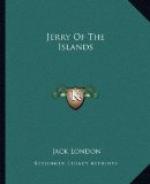Though Jerry never laid eyes on Somo again, Bashti returned with his tribe the same day, grinning and chuckling as he appraised the damage. Only a few grass houses had been damaged by the shells. Only a few coconuts had been chopped down. And as for the slain pigs, lest they spoil, he made of their carcasses a great feast. One shell had knocked a hole through his sea-wall. He enlarged it for a launching-ways, faced the sides of it with dry-fitted coral rock, and gave orders for the building of an additional canoe-house. The only vexation he suffered was the death of Nalasu and the disappearance of Jerry—his two experiments in primitive eugenics.
CHAPTER XX
A week Jerry spent in the bush, deterred always from penetrating to the mountains by the bushmen who ever guarded the runways. And it would have gone hard with him in the matter of food, had he not, on the second day, encountered a lone small pig, evidently lost from its litter. It was his first hunting adventure for a living, and it prevented him from travelling farther, for, true to his instinct, he remained by his kill until it was nearly devoured.
True, he ranged widely about the neighbourhood, finding no other food he could capture. But always, until it was gone, he returned to the slain pig. Yet he was not happy in his freedom. He was too domesticated, too civilized. Too many thousands of years had elapsed since his ancestors had run freely wild. He was lonely. He could not get along without man. Too long had he, and the generations before him, lived in intimate relationship with the two-legged gods. Too long had his kind loved man, served him for love, endured for love, died for love, and, in return, been partly appreciated, less understood, and roughly loved.
So great was Jerry’s loneliness that even a two-legged black-god was desirable, since white-gods had long since faded into the limbo of the past. For all he might have known, had he been capable of conjecturing, the only white-gods in existence had perished. Acting on the assumption that a black-god was better than no god, when he had quite finished the little pig, he deflected his course to the left, down-hill, toward the sea. He did this, again without reasoning, merely because, in the subtle processes of his brain, experience worked. His experience had been to live always close by the sea; humans he had always encountered close by the sea; and down-hill had invariably led to the sea.
He came out upon the shore of the reef-sheltered lagoon where ruined grass houses told him men had lived. The jungle ran riot through the place. Six-inch trees, throated with rotten remnants of thatched roofs through which they had aspired toward the sun, rose about him. Quick-growing trees had shadowed the kingposts so that the idols and totems, seated in carved shark jaws, grinned greenly and monstrously




